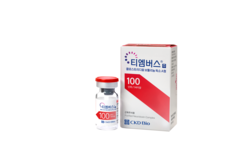Chong Kun Dang (CKD) Bio said Wednesday that the results of the Korean phase 3 clinical trial of Tyemvers, a next-generation botulinum toxin, were published in the Journal of Cosmetic Dermatology, an SCIE-ranked international journal.
The study was conducted from April to November 2023 at three institutions -- Kangbuk Samsung Hospital, Konkuk University Medical Center, and Chung-Ang University Hospital -- to demonstrate the safety and efficacy of Tyemvers in 300 patients with a four-point Facial Wrinkle Scale score of two (moderate) or higher.

The study, which randomized patients to receive Tyemvers and Botox, demonstrated non-inferiority of Tyemvers to Botox (onabotulinumtoxinA). Four weeks after the first dose, 80.7 percent of patients in the Tyemvers treatment group had at least a two-point improvement in their frown lines score (FWS), which was significantly better than that of the Botox treatment group (70.8 percent) (p = 0.0491).
The treatment effect was sustained up to 16 weeks, with about 70 percent of patients maintaining an improvement of at least one FWS point. In terms of safety, there was no significant difference in the incidence of adverse events between the treatment groups, and no serious adverse events were observed.
"This publication in an SCIE-level international journal is an important step in recognizing the efficacy and safety of Tyemvers," a CKD Bio official said. "We will expand the global toxin market with the Middle East and Indonesia as a bridgehead by securing differentiated competitiveness, such as transparency of strain source and the first halal certification for botulinum toxin preparations."
Tyemvers was developed based on a strain exclusively licensed from a reputable European research institute. It is the world's first halal-certified product by adopting a vegan (non-animal) manufacturing process that thoroughly excludes animal ingredients from product development to finished product production, according to CKD Bio.
It is characterized by the introduction of non-animal excipients instead of human serum albumin (HSA), which is commonly used in existing products, to block the possibility of infection by blood-derived pathogens, the company explained.

